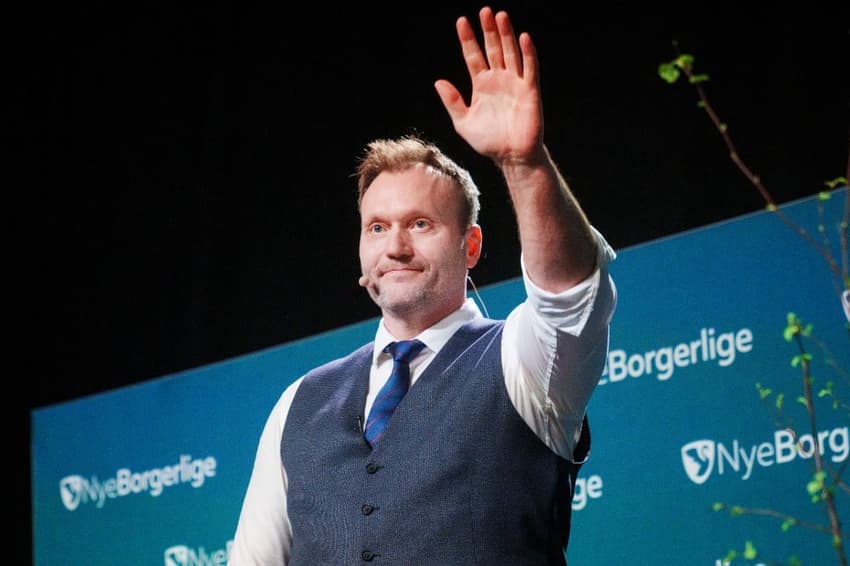Danish far-right party in crisis as new leader fired over funds dispute

The far-right Nye Borgerlige (New Right) party has deposed its leader Lars Boje Mathiesen and excluded him from the party over a dispute related to use of party funding.
An email sent from the party’s executive committee to its members, seen by news wire Ritzau, states that Mathiesen has been removed from both Nye Borgerlige’s parliamentary group and from party membership.
“Lars Boje Mathiesen has, incredibly, demanded a transfer of 350,000 kroner from an internal party account to his own private account for a personal branding campaign,” party secretary Jesper Hammer writes in the mail.
“A campaign in which the party is not included and which has no direct relevance or connection with Lars Boje Mathiesen’s membership and leadership of Nye Borgerlige,” he continues.
Mathiesen is yet to respond to a Ritzau request for comment.
In the email, Hammer also writes that Mathiesen had threatened to quit as leader himself if the money was not transferred to him by Friday.
“That Lars Boje Mathiesen additionally has asked for over 2.6 million kroner in total… to remain leader of our party has not put us in a milder frame of mind,” the email also states.
The party will be led by its executive committee until a new leader is found, according to the email.
The apparent dispute is the latest in a series of recent crises to have derailed the far-right party, which runs on a libertarian, EU-sceptic and anti-immigration platform.
Mathiesen took over as party leader from co-founder Pernille Vermund in February but the leadership change resulted in MP Mikkel Bjørn, the leader of parliament’s citizenship committee, defecting to the national conservative Danish People’s Party, citing differences with Mathiesen.
Leading members of the party’s youth group joined Bjørn in leaving in protest at Mathiesen’s leadership.
Another senior party member, MP Mette Thiesen, quit the party days after the November general election, and also eventually joined the Danish People’s Party.
Local politician Henriette Ergemann was chosen as new deputy leader by the party but was forced to step down after less than two weeks after media revealed she had espoused conspiracy theories about the Covid-19 vaccine on social media.
The defections meant Nye Borgerlige was reduced from six to four members of parliament, a number that appears to now have been further reduced by Mathiesen’s exclusion.
Comments
See Also
An email sent from the party’s executive committee to its members, seen by news wire Ritzau, states that Mathiesen has been removed from both Nye Borgerlige’s parliamentary group and from party membership.
“Lars Boje Mathiesen has, incredibly, demanded a transfer of 350,000 kroner from an internal party account to his own private account for a personal branding campaign,” party secretary Jesper Hammer writes in the mail.
“A campaign in which the party is not included and which has no direct relevance or connection with Lars Boje Mathiesen’s membership and leadership of Nye Borgerlige,” he continues.
Mathiesen is yet to respond to a Ritzau request for comment.
In the email, Hammer also writes that Mathiesen had threatened to quit as leader himself if the money was not transferred to him by Friday.
“That Lars Boje Mathiesen additionally has asked for over 2.6 million kroner in total… to remain leader of our party has not put us in a milder frame of mind,” the email also states.
The party will be led by its executive committee until a new leader is found, according to the email.
The apparent dispute is the latest in a series of recent crises to have derailed the far-right party, which runs on a libertarian, EU-sceptic and anti-immigration platform.
Mathiesen took over as party leader from co-founder Pernille Vermund in February but the leadership change resulted in MP Mikkel Bjørn, the leader of parliament’s citizenship committee, defecting to the national conservative Danish People’s Party, citing differences with Mathiesen.
Leading members of the party’s youth group joined Bjørn in leaving in protest at Mathiesen’s leadership.
Another senior party member, MP Mette Thiesen, quit the party days after the November general election, and also eventually joined the Danish People’s Party.
Local politician Henriette Ergemann was chosen as new deputy leader by the party but was forced to step down after less than two weeks after media revealed she had espoused conspiracy theories about the Covid-19 vaccine on social media.
The defections meant Nye Borgerlige was reduced from six to four members of parliament, a number that appears to now have been further reduced by Mathiesen’s exclusion.
Join the conversation in our comments section below. Share your own views and experience and if you have a question or suggestion for our journalists then email us at [email protected].
Please keep comments civil, constructive and on topic – and make sure to read our terms of use before getting involved.
Please log in here to leave a comment.